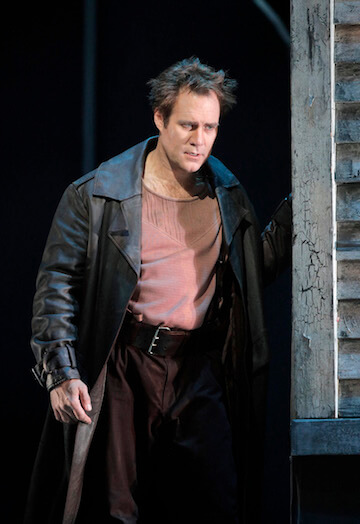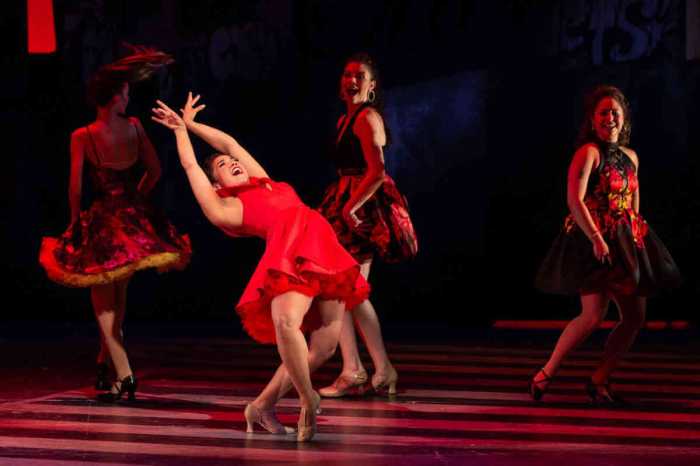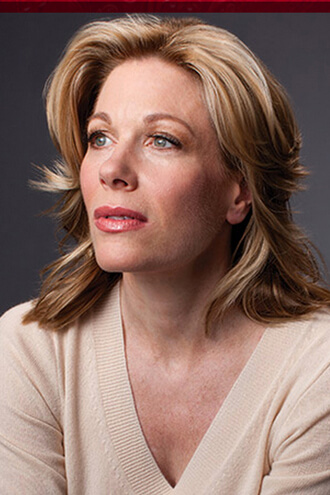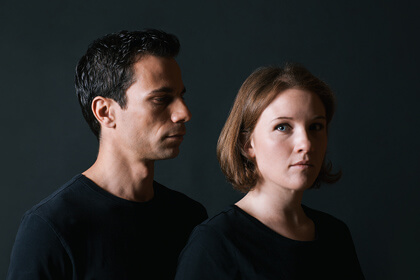Iréne Theorin in “Walkuere.” | CORY WEAVER/ SAN FRANCISCO OPERA
This year for its annual June Festival — which makes a great add-on to Frameline’s LGBTQ film festival and the Bay Area’s other Pride events — San Francisco Opera really delivered “festival goods.” The company revived Francesca Zambello’s “Ring” cycle for three traversals, developed and honed over the years locally and at Washington National Opera. New Yorkers dreading the prospect of seeing Robert Lepage’s reductive, unilluminating “Machine” staging during the next Met season can only envy those who had access to Zambello’s thoughtful, image-rich reading of this epic work. (Worry not, conductor Philippe Jordan and singers Christine Goerke, Jamie Barton, Karen Cargill, and Guenther Groissboeck promise high distinction.) SFO’s production wasn’t perfect — what production of this behemoth is? — but it has a point of view, addressing real social and political issues and not just flashy technological logistics.
From its roots as a so-spun ”American ‘Ring,’” with Alberich as a Gold Rush prospector and the Rhinemaidens as camp followers, the staging has morphed into what it’s hard not to call ecofeminist turf, setting the plot’s social and familial cataclysms on a visual background illustrating Nature’s defilement under Late Capitalism. Mime’s hut for example, is an ancient camper set among oil derricks and power wires. The sense of what was lost and what replaced it emerges most powerfully in deft, provocative videos by S. Katy Tucker and Jan Hartley and Mark McCullough’s impressive LED-enhanced lighting.
The male characters in the cycle exhibit a host of overweening abusive patriarchal behavior, and touches evoked a #MeToo awareness. More skillfully and movingly even than the last time around, not just Bruennhilde but Gutrune, the Rhinemaidens, and the women’s chorus jointly redeem and reset the world. Wonderful moments in the staging include the “Walkuere” Act II curtain rising on Wotan’s Gotham City-view Art Deco office and the next act’s parachuting in by (doubled) Valkyries carrying heroes’ pictures.
San Francisco Opera revives Francesca Zambello’s “Ring”
There were some problems. Already notable in the prologue evening was a superabundance of extra-musical — indeed unmusical — guffaws, chortles, and mirthless laughter emitted after a character’s own lines, as if in a bad provincial Noël Coward revival. It didn’t stop with “Rheingold” — which felt pretty trivial save for Stefan Margita’s assured, idiomatic Loge and Ronnita Miller’s puissant Erda, who came up through the floor dressed like a gospel singer — the added noises proved equally annoying and ineffective throughout.
Opera is not about aural realism, and deploying this kind of bad cable series sound effects — extending to parlando shouting of climactic words — will make it no more effective or palatable to new viewers. I question the wisdom of having the Woodbird — very well sung by Stacey Tappan, also a sonorous Woglinde — appear as a kind of hippie chick. Having Siegfried encounter a woman at this point reduces the shock he must feel as he removes the sleeping Bruennhilde’s armor. Occasionally, the tweaked surtitles raised questions, as in Wotan’s curiously inappositely Christian reference to “all creation.”
The company and audiences dodged a bullet when experienced Swedish soprano Iréne Theorin jumped in at very short notice as Bruennhilde for Evelyn Herlitzius. The German artist is a riveting singing actress but — on recent evidence — just not up to the role’s vocal demands. Theorin lacks expansiveness in her lower voice but came through pretty thrillingly in every other way: energetic, involved, handsome onstage, completely credible dramatically as immortal and lover both, with a youthful, well-projected, and shining soprano that reveled in the high C’s. Brava Diva!
Karita Mattila (Sieglinde), looking maybe half her age, brought star presence. Very weak in the lower register and more than a little pitchy, she still shone in the middle and upper middle; the few peaks were decently surmounted.
I’ve heard good work elsewhere from Greer Grimsley (Wotan/ Wanderer) but for the first two operas he seemed essentially a placeholder: decent but uninspiring, with a tense voice only rarely in focus or sufficiently dominant. In “Siegfried,” Grimsley found a more individual character and improved noticeably in tonal clarity.
Alberich was a substantial singing actor, Falk Struckmann; his dark voice now has more sap in its lower end and he was particularly chortly, but his was the only native German — most welcome — and he nailed his cameo dream-bound appearance in “Goetterdaemmerung,” among the cycle’s greatest scenes.
This was my third time seeing Daniel Brenna’s Siegfried and, although he is slightly more nuanced and in better physical shape this time around, he strikes me as a not very interesting or sophisticated singer whose vocal endowments suit better the second-line German houses where he developed. But one has heard much worse; it’s a dislikable role, impossible to cast. Brenna has relative youth and energy on his side, and he made it through the double marathon — both “Siegfried” and “Goetterdaemmerung” in one weekend — though with a weak start the first night and some signs of tiring in both operas’ third acts.
With David Cangelosi’s professional but whiny-toned Mime hamming it up, Act One of “Siegfried” seemed very long indeed, bear-costumed extra or not.
Brandon Jovanovich in Francesca Zambello’s production of Wagner’s “Walkuere” at San Francisco Opera. | CORY WEAVER/ SAN FRANCISCO OPERA
Brandon Jovanovich made Siegmund sexy, sympathetic, and credibly heroic: his timbre is very good rather than “great” or particularly individual, but he shapes phrases very well and gives a complete operatic performance. He was far and away the best Froh I’ve seen or heard in decades of hearing “Rheingold”: a preening, inept minor member of a powerful family who keeps falling on his face — evoking a Trump son. And here Jovanovich’s voice shone. Opposite his precise characterization, Brian Mulligan emerged kind of unformed as Donner, but in Gunther’s ungrateful music he sounded just lovely — he might graduate to the “Rheingold” Wotan at some point.
Out mezzo Barton didn’t deliver the goods as the “Rheingold” Fricka that we heard at he New York Phil last year, but she sounded excellent as the marriage goddess in “Walkuere” and also as Second Norn and Waltraute in the final opera.
Melissa Citro has strengthened the top of her soprano, so that she can nail Helmwige high C’s in the famed “Ride.” Between them, Citro and Zambello create the most detailed Gutrune imaginable, at once zanily ditzy and deeply touching. Some festival should star Citro — a born comedienne with the requisite great looks and command of German — in Strauss’ “Intermezzo.”
Renee Tatum made a strikingly rich-voiced Flosshilde. Miller (First Norn) and the very promising Sarah Cambidge (Third Norn) also offered a high vocal standard.
The flies in the ointment were the fussy, self-admiring Cangelosi and bass Andrea Silvestrelli (Fasolt, Hagen), whose career divides opinion. Tall and ursine, at ease onstage, he has a huge instrument that wows many people. I hear a growly, pitched-challenged, meat grindery noise, intensely unpleasant. But he garnered ovations from many.
With Zambello and Theorin, the heroes of this “Ring” were conductor Donald Runnicles and the orchestra. The audience seemed thrilled to have their former music director back in the pit. He led with dispatch but total command, and (save for a few brass glitches) the orchestra — not usually the equal of the Met’s or Lyric Opera of Chicago’s — went all out to shine. Particular credit redounds to the trumpet, harps, and the magnificent anvils marking the border of Nibelheim. Runnicles and the orchestra won huge applause.
Next June, SFO presents “Carmen” (J’nai Bridges, Matthew Polenzani, Kyle Ketelsen), “Orlando” (Sasha Cooke, Heidi Stober, David Daniels), and “Rusalka” (Rachel Willis-Sorensen, Jovanovich, Barton, Ferruccio Furlanetto).
David Shengold (shengold@yahoo.com) writes about opera for many venues.





































